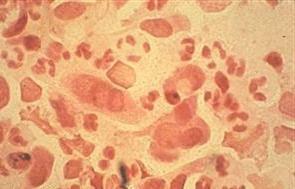- Location Features
- Locating
- The location of the liver for various diseases
- Anatomy
- Related Videos
The liver is the largest organ in the body in humans. It performs a number of vital functions and is closely related to all organs of the digestive tract. Blood filtration, control of metabolic processes, neutralization of harmful substances - for all this and many other things the liver responds.
Without this organ, life would be simply impossible. This is our defender against bacterial and viral infection. It is a reservoir of spare blood. This protects the body with large blood loss. The liver consists of two main parts, which are connected by a bundle of blood vessels. The organ capsule divides it into small lobes.
Where the liver is located and what functions it performs, not everyone knows. Nevertheless, this information must be known in order to timely identify the symptoms of liver disease and provide timely assistance. So, in which side is the liver of a person? What is below: liver or stomach? We will deal with these and many other issues.
Location Features
Where is the liver located? The liver is in such a way that other organs of the gastrointestinal tract, for example, the pancreas, can talk about its disorders. The fact that the liver produces a bile secret, which is stored in the cavity of the gallbladder.
In the process of digestion, bile passes through the ducts into the duodenum. Normally, pancreatic juice and the bile secret interact, but with existing disorders, the pancreas has a negative effect.
The liver is on the right or left? The organ is located in the abdominal cavity below the diaphragm in the region of the right hypochondrium. To be more precise, it is worth noting the fact that the liver is a large organ and occupies a large part.
Therefore, it would be more correct to say that there is a large proportion in the right side of the abdominal cavity. The left part is much smaller and located in the left side of the abdomen near the spleen. The lower part of the right lobe reaches the kidney. Normally, the edges of the organ are even, the structure is uniform.

The photo shows the arrangement of the liver
The upper border of the organ is located at the level of the nipples, and the lower one is covered by the ribs. The closest organ is the gallbladder. They are closely related to each other by digestive and metabolic processes. The upper part of the liver rests against the diaphragm, which is why when the organ is enlarged, problems with breathing may occur.
The location of the liver in each person may be somewhat different and it is associated with the anatomical structure. As statistics show, only about five percent of people have a healthy liver. The condition can be aggravated by an ecological situation, bad habits, wrong nutrition.
With the help of percussion and palpation, you can get accurate information about the boundaries of the liver, its functional disorders and the existing structural changes. Expansion of the boundaries, as well as their displacement along the vertical axis relative to the costal arch, may indicate the development of the pathological process on the part of the hepatocytes.
Locating
Internal organs differ not only in size, function, but also in density. When they are tapping, there are various sound fluctuations. Due to the analysis of these sounds, it is possible to obtain reliable information about the localization of internal organs and their functional activity.
There are two techniques for percussion. The first is a direct tapping on the abdominal cavity. The second technique involves the use of a plemsimeter. Diagnostic value is the definition of absolute dullness - parts of the liver that are not covered by a pulmonary tissue.

The liver itself does not hurt, since there are no painful receptors in it, yet in diseases the soreness appears in the region of the right hypochondrium
Experts conduct percussion on the Kurlov method, it is considered the most informative. First, the organ is indicated by means of conditional points. The upper boundary is located on the right side along the okologogrudnoy line at the level of the sixth rib. From this area down and starts tapping.
When you change the sound, the first point is marked. On the same line, the lower point is determined and the tapping is performed from the right ileal region. The third mark represents the intersection of the anterior median line and the first point. The fourth mark determines from the navel up to blunting the sound.
Palpation is a physical method, which is based on tactile perception. It can be performed both in a prone position and standing. If a person is standing, the edge of the liver is shown from under the ribs by about two centimeters.
If, however, the feeling is carried out in the supine position, then the patient's head should be slightly elevated, and the legs can either be completely straightened or slightly bent at the knees. The patient is recommended to put his hands on the chest, this will help limit the mobility of the chest during inspiration and relax the muscles of the anterior abdominal wall.
With the help of finger movements, you can feel the boundaries, consistency, and the location of the internal organs relative to each other. With various diseases, this technique leads to an increase in painful flare. Palpation is usually performed after percussion.
The patient should take a deep breath, so that the lower edge of the liver falls below the costal arch. At this point, the specialist has fingers on the abdominal wall and can easily feel the exposed part of the organ.

Palpation and percussion help determine the boundaries of the organ
The location of the liver for various diseases
In the early stages of damage to the liver cells, the patient may not experience any uncomfortable sensations. A painful outbreak occurs already at the stage when the organ increases in size and its capsule is stretched.
Speaking specifically about viral hepatitis, the incubation period of these diseases is quite impressive. Sometimes from the time of infection to the appearance of the first symptoms can take about six months. Although during this time the patient is not bothered by any symptoms, degenerative changes already occur in the hepatic tissue.
If a person does not know which side of the liver, it means that she has not bothered him yet, or the person is far from medicine. Be that as it may, this does not mean that the liver is all right. Many people know how the liver hurts, because according to statistics every third inhabitant of the world leads an unhealthy lifestyle.
The greater the burden on the organ, the more vulnerable it becomes. Therefore, everyone's task is to support the work of our filter with the help of dietary nutrition and vitamin therapy. In the liver there are no pain receptors, therefore the organ can not be ill by itself.
The reason for the omission of the organ can be associated with a fall or developing diseases: jaundice, cirrhosis, tumor processes, heart failure, acute infections, and more. The following symptoms may indicate a developing pathology: severity in the right hypochondrium, severity, nausea, bitterness in the mouth, changes in appetite, discomfort after taking sharp or fried foods.
Unpleasant sensations increase with physical activity. The increase in the size of the body and the tightness of neighboring organs leads to the appearance of painful sensations. Then the person begins to experience pain, heaviness and fatigue.
An important property of the liver is its property for self-healing. This means that if you remove harmful food from your diet, stop drinking, smoke, and start taking hepatoprotective drugs, then after a while you can return its former appearance and normal functioning.

The liver occupies a significant part of the abdominal cavity
Anatomy
Specialists identify four main parts of the body, namely:
- Right. It is the largest segment and completely fills the right hypochondrium. With the help of percussion, the right part is the most accessible for research. This segment is the most functionally active, which is why the disease significantly changes its size.
- The left one. In size this segment is smaller than the right one. It is located in the left part of the epigastric region (the stomach is located).
- Square. Corresponds to the lower segment of the organ. Is segmental apparatus of the left lobe.
- Tailed. The portal of the liver is separated from the square part and is located behind it. Often this fraction is the source of the tumor process. The location of the caudate segment makes it difficult to conduct an operative intervention.
We distinguish the main functions of the liver:
- detoxification. In a simple language we can say that the liver is the purifying base of our body. It neutralizes toxic substances, metabolic products, foreign substances;
- production of albumin, clotting factors - proteins necessary for normal vital functions of the organism;
- participation in metabolic processes and digestion;
- protective function.
So, the question of where the liver is located, experts have long answered. Knowledge of this helps in the timely detection of pathology and prevent the development of dangerous complications. The location of the organ helps determine percussion and deep palpation.
By itself, the liver can not hurt because it does not have pain receptors. With existing diseases, painful sensations arise in the region of the right hypochondrium. Do not forget, proper nutrition, a healthy lifestyle and the absence of bad habits - is a pledge of a healthy liver!



